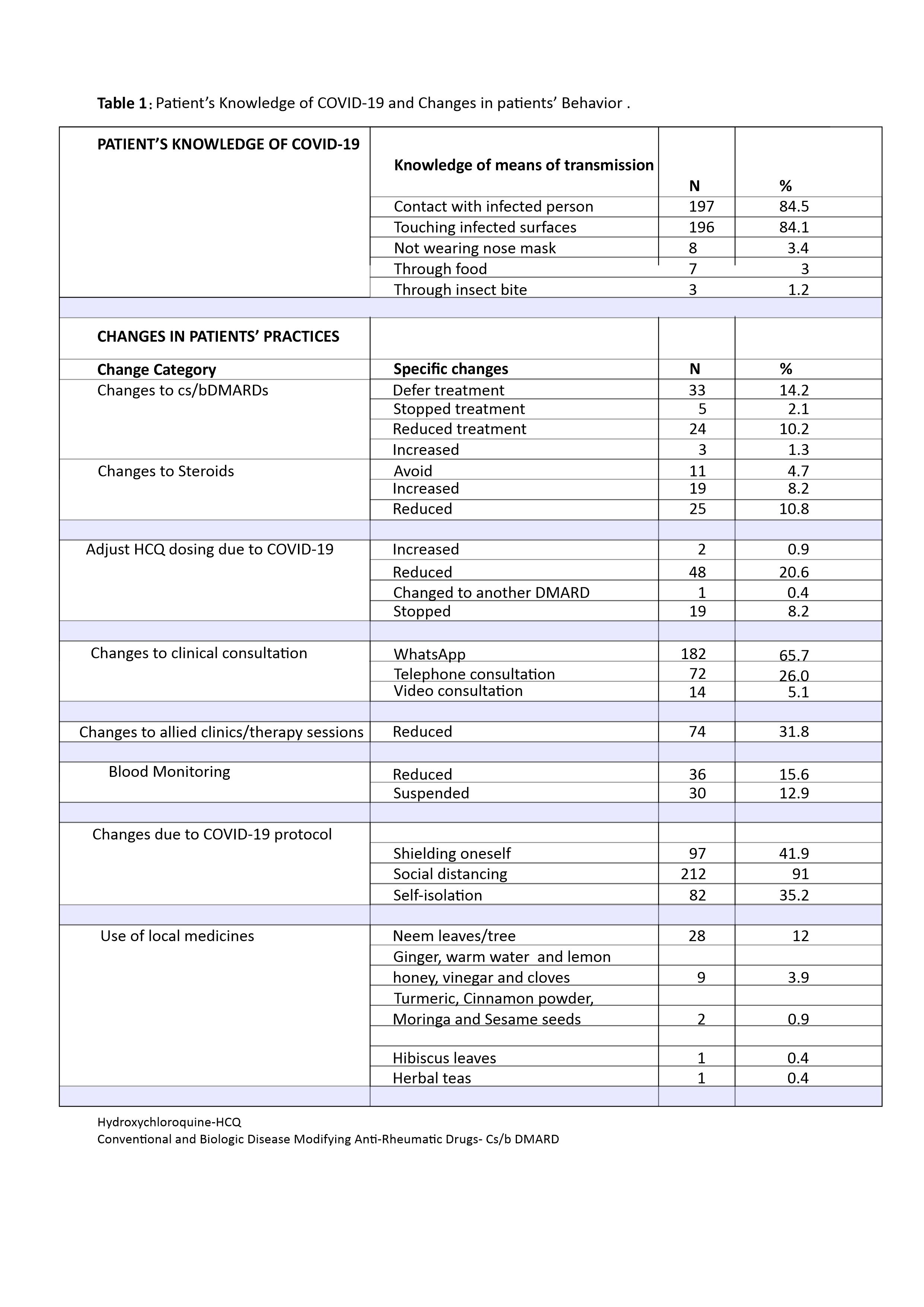Back
Poster Session A
Epidemiology, health policy and outcomes
Session: (0187–0213) Patient Outcomes, Preferences, and Attitudes Poster I
0188: COVID-19 and Autoimmune Rheumatic Patients: Behavioral Changes Adopted by Patients in the Midst of the Pandemic
Saturday, November 12, 2022
1:00 PM – 3:00 PM Eastern Time
Location: Virtual Poster Hall
- ID
Ida Dey, MD, MSc, FRCP, MACR
University of Ghana Medical School
Accra, Ghana
Abstract Poster Presenter(s)
Dzifa Dey1, Bright Katso2, Saudatu Issaka2, Derrick Nyame3 and Patrick Adjei1, 1University of Ghana Medical School, Accra, Ghana, 2Rheumatology Unit Korle bu Teaching Hospital, Accra, Ghana, 3Korle bu Teaching Hospital, Accra, Ghana
Background/Purpose: Several changes following the COVID-19 pandemic have emerged globally regarding the delivery of healthcare services. Giving concerns that, patients with Autoimmune Rheumatic Disease (AIRD) may be at increased risk of severe COVID-19 disease, there is a significant need to look into behavioral changes (healthy or unhealthy) developed among this patient group in response to the global shift in healthcare delivery. This study sought to investigate the personal experiences of autoimmune rheumatic disease patients in Ghana following the outbreak.
Methods: We conducted a cross-sectional study among patients aged 18 years and above from the Autoimmune Rheumatic patient cohort at the Korle-Bu Teaching Hospital (KBTH) and those admitted at the hospital's COVID-19 treatment center (from 1st August 2020 to 1st July 2021). We recruited participants via face-to-face visits to the KBTH rheumatology clinic, telephone and electronic surveys with the patients who did not report to clinic. Participants completed a structured questionnaire (both in print and electronic) on patient behavioral changes. We measured patients' overall behavior change by observing specific changes in patients' practices relating to their "prescription", "service utilization" and "clinical advice". Data on patient demographics and COVID-19 status were obtained using chart reviews
Results: We recruited 233 patients. Mean age and disease duration were 37 years and 77.6 months respectively. Majority of the participants 209 (89.7%) were females. The most common AIRD was SLE (54.5%). The majority 197 (84.5%) had good knowledge about COVID-19. Specific changes observed in patients' practices are shown in table 1. About 65 (27.8%) patients made changes to the doses of their cs/bDMARDs and 55 (23.7%) to their steroids. Approximately 48 (20.6% ) patients reduced their Hydroxychloroquine dosage to conserve supply. Around 96.8% of total participants discontinued regular in-person hospital visits and adopted remote means of accessing care such as WhatsApp, telephone and video consultation either individually or in combination. 74 (31.8%) also reduced their regular visits to nurse-led, occupational therapy and physiotherapy clinics. Social distancing was adopted by 212 (91%) patients. Self-isolation and the use of personal protective equipment was adopted by 179 (77.1%) patients.
Conclusion: The outbreak of COVID-19 has resulted in various behavioral changes in AIRD patients as reported among our study cohort. Majority of these changes reflected in patient's attitude towards seeking healthcare remotely and observing COVID-19 protocols as a means of protection. Despite the perceived risks, most did not make changes to their medication doses. This could inform practice and health care interventions in future such as telemedicine.
 Table 1: Patient’s Knowledge of COVID-19 and Changes in patients’ Behaviour
Table 1: Patient’s Knowledge of COVID-19 and Changes in patients’ Behaviour
Disclosures: D. Dey, Roche; B. Katso, None; S. Issaka, None; D. Nyame, None; P. Adjei, None.
Background/Purpose: Several changes following the COVID-19 pandemic have emerged globally regarding the delivery of healthcare services. Giving concerns that, patients with Autoimmune Rheumatic Disease (AIRD) may be at increased risk of severe COVID-19 disease, there is a significant need to look into behavioral changes (healthy or unhealthy) developed among this patient group in response to the global shift in healthcare delivery. This study sought to investigate the personal experiences of autoimmune rheumatic disease patients in Ghana following the outbreak.
Methods: We conducted a cross-sectional study among patients aged 18 years and above from the Autoimmune Rheumatic patient cohort at the Korle-Bu Teaching Hospital (KBTH) and those admitted at the hospital's COVID-19 treatment center (from 1st August 2020 to 1st July 2021). We recruited participants via face-to-face visits to the KBTH rheumatology clinic, telephone and electronic surveys with the patients who did not report to clinic. Participants completed a structured questionnaire (both in print and electronic) on patient behavioral changes. We measured patients' overall behavior change by observing specific changes in patients' practices relating to their "prescription", "service utilization" and "clinical advice". Data on patient demographics and COVID-19 status were obtained using chart reviews
Results: We recruited 233 patients. Mean age and disease duration were 37 years and 77.6 months respectively. Majority of the participants 209 (89.7%) were females. The most common AIRD was SLE (54.5%). The majority 197 (84.5%) had good knowledge about COVID-19. Specific changes observed in patients' practices are shown in table 1. About 65 (27.8%) patients made changes to the doses of their cs/bDMARDs and 55 (23.7%) to their steroids. Approximately 48 (20.6% ) patients reduced their Hydroxychloroquine dosage to conserve supply. Around 96.8% of total participants discontinued regular in-person hospital visits and adopted remote means of accessing care such as WhatsApp, telephone and video consultation either individually or in combination. 74 (31.8%) also reduced their regular visits to nurse-led, occupational therapy and physiotherapy clinics. Social distancing was adopted by 212 (91%) patients. Self-isolation and the use of personal protective equipment was adopted by 179 (77.1%) patients.
Conclusion: The outbreak of COVID-19 has resulted in various behavioral changes in AIRD patients as reported among our study cohort. Majority of these changes reflected in patient's attitude towards seeking healthcare remotely and observing COVID-19 protocols as a means of protection. Despite the perceived risks, most did not make changes to their medication doses. This could inform practice and health care interventions in future such as telemedicine.
 Table 1: Patient’s Knowledge of COVID-19 and Changes in patients’ Behaviour
Table 1: Patient’s Knowledge of COVID-19 and Changes in patients’ BehaviourDisclosures: D. Dey, Roche; B. Katso, None; S. Issaka, None; D. Nyame, None; P. Adjei, None.

